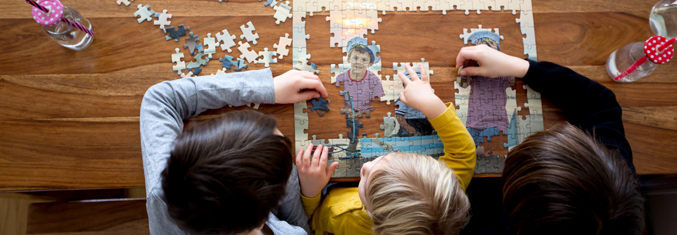
A Fun Venture in Creating Order from Chaos
I am sure you remember the bare toilet paper shelves in March, as people were hoarding supplies out of fear. However, were you also aware that jigsaw puzzles were flying off the shelves almost as quickly as toilet paper? Puzzle maker Ravensburger saw sales increase 370% year over year in late March.
With more people staying at home, it makes sense that this demand would increase. However, I find it fascinating that an “old-fashioned,” non-electronic diversion has made a resurgence in 2020. Interestingly, a similar surge in puzzle demand occurred in 1933 during the Great Depression. During times of economic uncertainty, puzzles seem to supply comfort as we yearn for a sense of control in some part of our life.
When the local library reopened on a limited basis in June, the first place I went was to the puzzle table. I picked up two 1,000-piece puzzles thinking it would keep us occupied for a few weeks during quarantine. Four days later, I was back at the puzzle table picking out two more 1,000-piece puzzles. In the midst of the chaos and uncertainty in the world around me, I found it so comforting to engage in the simple pleasure of putting together a puzzle. Faced with decisions that had no easy solutions, such as whether to send our kids back to school, bringing order to a jumble of puzzle pieces was very satisfying. There are other benefits of jigsaw puzzles, besides providing a sense of control during uncertain times:
Memory improvement – Puzzles build short-term memory and help with concentration. Some studies have shown puzzles can be helpful in slowing dementia in the elderly.
Problem solving – Puzzles provide a challenge for your brain. Sorting and piecing together colors, shapes and images tests problem-solving skills and provides a workout for your brain.
Stress relief – Puzzles force a mindfulness that is similar to spending time in meditation. You can forget about the stresses of the world while working on a puzzle. The small victories inherent in solving a puzzle (fitting two puzzle pieces together) causes our brains to release dopamine, boosting our mood.
Time away from screens – I have, like many of you, greatly increased my screen time during the last several months. Puzzles provide a nice break from technology, especially for children who tend to be overloaded with screen time.
As you continue your time at home, I encourage you to check out your local library to see if they loan out puzzles. If you like to support local business and you’re in Little Rock, check out Moxy Modern Mercantile, a shop in SoMa. They have a wide puzzle selection offering free local delivery Downtown or Midtown.
Or get online and check out the puzzle selection at Amazon.com or www.Ravensburger.com. On the Ravensburger site, they have an apology pop-up saying their adult puzzles are only available in stores right now due to high demand. But there are puzzles for kids on their site.
Amazon has a good selection of other brands and here’s the good news – like toilet paper, puzzles have become much easier to find since March!
As always, we are here for you. Please email or call if you want to set up a Zoom videoconference meeting or talk by phone.
Mary McCraw, CFP®

© 2020 The Arkansas Financial Group, Inc., All rights reserved.
Please remember that past performance may not be indicative of future results. Different types of investments involve varying degrees of risk, and there can be no assurance that the future performance of any specific investment, investment strategy, or product (including the investments and/or investment strategies recommended or undertaken by The Arkansas Financial Group, Inc. (“AFG”), or any non-investment related content, made reference to directly or indirectly in this newsletter will be profitable, equal any corresponding indicated historical performance level(s), be suitable for your portfolio or individual situation, or prove successful. Due to various factors, including changing market conditions and/or applicable laws, the content may no longer be reflective of current opinions or positions. Moreover, you should not assume that any discussion or information contained in this newsletter serves as the receipt of, or as a substitute for, personalized investment advice from AFG. To the extent that a reader has any questions regarding the applicability of any specific issue discussed above to his/her individual situation, he/she is encouraged to consult with the professional advisor of his/her choosing. AFG is neither a law firm, nor a certified public accounting firm, and no portion of the newsletter content should be construed as legal or accounting advice. A copy of AFG’s current written disclosure Brochure discussing our advisory services and fees is available upon request.
Please Note: If you are a AFG client, please remember to contact AFG, in writing, if there are any changes in your personal/financial situation or investment objectives for the purpose of reviewing/evaluating/revising our previous recommendations and/or services, or if you would like to impose, add, or to modify any reasonable restrictions to our investment advisory services. AFG shall continue to rely on the accuracy of information that you have provided.
 Form CRS/ADV & Disclosures.
Form CRS/ADV & Disclosures. 